-
Featured News
Patti Smith Upcoming Tour for 50th Anniversary of Horses
 By Harvey Kubernik
“Horses was like the first cannon blast in a war – frightening and disorienting. I mean, she was so unlike the FM radio terrain in every way. She was literate, aggress
By Harvey Kubernik
“Horses was like the first cannon blast in a war – frightening and disorienting. I mean, she was so unlike the FM radio terrain in every way. She was literate, aggress -
Featured Articles
Chasing the White Light: Lou Reed, the Telepathic Secretary and Metal Machine Music
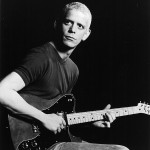 By David Holzer
Fifty years ago, Lou Reed released Transformer. In among “Walk on the Wild Side,” “Make Up” and “Vicious,” cuts that would launch a cartoon Rock N Roll Animal pers
By David Holzer
Fifty years ago, Lou Reed released Transformer. In among “Walk on the Wild Side,” “Make Up” and “Vicious,” cuts that would launch a cartoon Rock N Roll Animal pers -
The Attack: An Interview with Richard Shirman
By Mike Stax
Inhabiting a region of the sonic solar system somewhere between the Creation and the Small Faces, the Attack languished in comparative obscurity back in their day, only to be recognized decades later as one of the most exciting bands of the era.
That none of the band’s four singles for Decca cracked the charts was more down to bad luck and record company incompetence than any shortcomings on the band’s part. Their first effort, in January 1967, was a sharp version of the Ohio Express/Standells nugget “Try It,” backed with the great, Hammond-drenched mover “We Don’t Know.” Composed by singer Richard Shirman and lead guitarist Davy O’List, the song was nominally based on an obscure soul single, Mona Lisa’s “They Don’t Know,” with new, sarcastic social comment lyrics, including the opening salvo: “We don’t know about the H-Bomb / We don’t know about drugs / We don’t know what is going on / They say that we are thugs.”
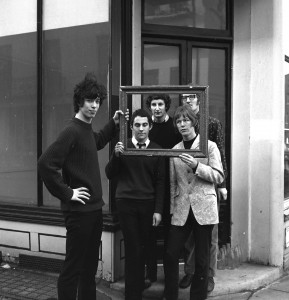
The Attack, 1967. L to R: Richard Shirman, Barney Barnfield, Davy O’List, Gerry Henderson, Bob Hodges (glasses). (Photo courtesy Phil Smee)
While “Try It” failed to click with the record buying public, the band felt they were onto a sure thing with their next release, “Hi Ho Silver Lining,” but they were beaten to the bunch by Jeff Beck who romped into the charts with his Mickie Most-produced version after the Attack’s record was delayed at the pressing plant. The B-side was a cracker too. Based on a blistering guitar hook by O’List, “Any More Than I Do” was the Attack at their most incendiary, and still thrills every time. Totally disillusioned by the failure of “Hi Ho Silver Lining,” this lineup folded shortly afterwards, with O’List going on to the Nice.
However, Shirman rallied the group with new members and a third single appeared a few months later, again pairing a commercial A-side by an outside writer with a harder-edged band-created flip. “Created By Clive” was a clever piece of social satire aimed at Swinging London’s fashion world, but any hope of a hit was doomed by the simultaneous release of a competing version by the Syn—ironically on Deram, a subsidiary of the very same record company. On the B-side the superior “Colour Of My Mind,” written by Shirman, was a hard driving psych piece with some fine organ work.
The Attack’s fourth single, “Neville Thumbcatch,” was also their strangest, the sad tale of a solitary man dedicated to the simple joys of gardening, the spoken verse section delivered with impeccable comic pacing by Shirman in his slightly plummy London accent. On the other side, “Lady Orange Peel,” was a nice, sultry psych-tinged number. According to some reports, the wonderful “Magic in the Air,” written by new guitarist John Cann, (aka John DuCann), was originally pegged to be the single’s A-side, but that track would remain unissued, and “Neville Thumbcatch”/ “Lady Orange Peel” would be the band’s swansong.
By the beginning of 1968 the Attack had reconfigured as a quartet, with DuCann now their songwriter-in-chief. This line-up was responsible for half a dozen largely excellent tracks, said to be for a planned album tentatively titled Roman God of War. Hard riffing highlights from this era of the band include “Go Your Way,” “Feel Like Flying” and “Freedom For You.” The band would break up later that year with some members regrouping as Andromeda (DuCann would later form Atomic Rooster).
In the last two decades the band’s eight A- and B-sides, along with the unreleased material from the DuCann era, have been recycled endlessly on various compilations and anthologies, some of dubious legality. Recently though, RPM’s Bam-Caruso subsidiary released the first completely legitimate Attack anthology. The appropriately titled ABOUT TIME! includes not only all of the above mentioned tracks—taken from the original master tapes—but also four additional previously unreleased cuts: a cover of the Young Rascals’ “Come On Up” and an alternate version of “Created By Clive” from a 1967 BBC session, plus “Sympathy For the Devil” and “Anything,” two very fine tracks from an early 1969 acetate on which Shirman is backed by various ex-Attack members. The CD packaging, stylishly designed by the estimable Mr Phil Smee, includes liner notes by Chris Welch, track-by-track comments from Shirman, and tons of rare photos.
To mark the release of this, the definitive Attack collection, we talked with Attack main man Richard Shirman.
UT: Before the Attack you were a dancer on Ready Steady Go for a while. Can you tell me a bit about that?
RS: Well, I wasn’t an official dancer. I was one of the people who went to Ready Steady Go every weekend and we used to dance. When I first started going there I was only about 14 years-old, so I started quite young, really. I used to go up there with a girl—my parents used to let a room out in our house, and she was one of those who moved in. She was older than me, but of course I was like a sponge—anything to do with groups I wanted to know, and she was at the time going out with Pete Townshend. How long that lasted I don’t know, but then I think she was going out with a guy who was like the floor manager for Ready Steady Go, who was married to Sandie Shaw…So I just used to go along to Ready Steady Go every weekend.
UT: Did they have some kind of dress code where they would only allow cool looking people into the studio, or at least be in camera shot?
RS: Actually, to be perfectly honest, I haven’t a clue! I don’t think it was that they actually applied a dress code, it’s just that everybody who went there was like, well, “The weekend starts here,” as the saying went, and you’d got your trendy stuff on simply because you were going along to it. I should imagine that those who appeared on camera were probably the best looking—well, it’s like cameramen all over the world: if there’s a nice looking girl then the cameraman zooms in on her. That’s how it works, isn’t it?
UT: Did you get to see yourself on TV?
RS: Well, no, because it was live, so I have no idea if I was ever on camera or not.
UT: What groups do you remember seeing in the TV studio that were particularly memorable?
RS: I do remember—this shows what a dirty old man I am—I do remember being fascinated by a blue vein in Marianne Faithfull’s décolletage—transfixed by it. I remember the Supremes and like when the Who were on and things like that, but I don’t remember that clearly, to be honest. I do know that when Ready Steady Go moved, because originally it was in High Holborn, right in the middle of town, but then it moved out to the sticks, to Stonebridge Park near Wembley, which is about 10 miles away, and afterwards there’d be a crowd of us would go along to a place in Golders Green called the Refectory, which was just a pub, but there would be playing, usually, the Birds—Ronnie Wood, Ali McKenzie, Pete [McDaniel] and all those people. I got quite matey with Ronnie Wood. In fact, when Davy O’List left the Attack, the first person I had lined up and had talked to about replacing him was in fact Ronnie Wood. But then he was offered the bass playing gig with Jeff Beck—who had the hit with “Hi Ho Silver Lining”—and that was sort of the end of that! (laughs) If things had been slightly different, just think where he could be now! (laughs)
UT: You started out basically playing R&B and soul covers with a band called the Soul System, right?
RS: With the Soul System there were no such thing as soul covers; it was R&B. With the Attack we started playing soul covers. In fact, I can even remember some of the tunes we used to play: “See Saw,” Don Covay, “Ride Your Pony,” Lee Dorsey…Edwin Starr “SOS,” Sam & Dave “You Don’t Know Like I Know”—which were all current at the time and that’s the sort of stuff we preferred to play in the Attack.
I also knew, through a guy I’d met in London going to see the Pretty Things, I think—he was a big fan—an American guy from Florida sent me stuff and one of the songs I think I probably nicked a few of the ideas for the B-side of our first single, “We Don’t Know.” One of the songs he sent us was “In the Midnight Hour,” and we played that for at least six or seven months before it came out here. But it never occurred to us, these things, because in those days all you tried to do was to sound as much like the real thing as possible.
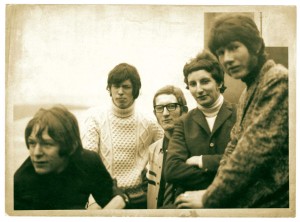
The Attack, first lineup, early 1967. L to R: Gerry Henderson, Richard Shirman, Bob Hodges, Davy O’List, Alan Whitehead. (Photo courtesy Phil Smee)
UT: And how did the sound and the repertoire start to change? Because you were still doing soul songs but you were also starting to write your own material. How did that evolution take place?
RS: What we played on stage changed when I got the last version of the band together, which was John Cann [aka DuCann], Roger Deane and Keith Hodge, because John was writing a lot at the time, and I was a lazy so-and-so. All I was interested in really was drinking and women. So if the group had rehearsed a song and they gave me lyrics to learn, I learned them and sang them—one or two things like that. Sometimes we rehearsed, he came round to mine and we went over the songs acoustically, but I suppose the difference in the material was all down to John joining the group.
UT: So prior to that, when you still had Davy in the band, live you were still doing pretty much soul covers and I suppose some of the singles were in your live set?
RS: Absolutely right. Davy left after the second single, which was “Hi Ho Silver Lining,” but the B-side, “Any More Than I Do,” for an 18-year-old kid, what guitar playing!
UT: That’s such a heavy song for that time, early 1967.
RS: And of course in those days one had half an hour to write—if it still needed writing—and record and do everything with a B-side. So for “Any More Than I Do” he said, “I’ve got a couple of ideas.” I said, “OK, you go out, Davy, and rehearse the guys so they know it and I’ll write the lyrics!” (laughs) And the opening lyrics to that particular song were the titles to two recent number ones of the time: “Standing in the shadows”—which is obviously the Four Tops—and “Sitting In the Park” which was Bobby Hebb. And that’s the opening lines: “Standing in the shadows / sitting in the park…” And then if I can find something to rhyme with it I’m away! (laughs)
UT: It seemed like the pattern for all your four singles was always a more commercial song by outside writers on the A-side and a number by the band on the flip—was that by design?
RS: The B-sides of the singles were mostly written by us. The first one [“We Don’t Know”] and the second one [“Any More Than I Do”] Dave and I wrote together. The third one [“Colour of My Mind”] and the fourth one [“Lady Orange Peel”], I wrote, but by that time Dave wasn’t in the group any longer.
UT: And the A-sides were always by outside writers.
RS: Yes, in those days, record companies said, “Oh, this is commercial.” In those days I always thought commercial meant it would sell, but obviously it doesn’t. (laughs) But they’d say, “This is commercial,” so we’d say, “OK.” You didn’t argue—I was 17, for heavens sake! At 17, 18 you don’t argue with these people who know all about it.
I never quite understood why our first record never made any impression, “Try It,” because that was quite pokey, quite powerful and had everything that one needed for a hit—even a simple chorus, you know: “Try it, yeah! Try it, yeah!” There was nothing complicated about it at all, but there we are.
UT: Well, Decca were notorious for putting records out and just letting them die.
RS: “Hi Ho Silver Lining,” though, was obviously going to be a hit song. When our version of “Hi Ho Silver Lining” came out, the story goes that it came out at roughly the same time as Tom Jones and Engelbert Humperdinck and a Rolling Stones record came out as well, and their factories were only pressing those three and ours didn’t get pressed. There was plenty of orders for it, but it didn’t get pressed, and by the time they were being pressed, of course, Jeff Beck was away! The guy who wrote “Hi Ho Silver Lining” was Scott English, an American who in fact had been with the Four Seasons, and I remember him coming over and actually commenting on us and saying, “This is exactly how I imagined the song to be. They’ve done it beautifully.” Mind you, I bet when he gets the royalty checks in from the Jeff Beck version he doesn’t throw them out! (laughs)
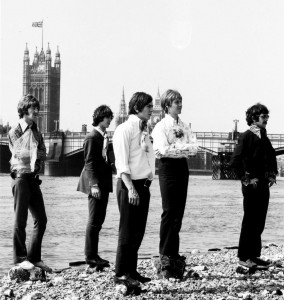
Er… the camera’s over here, boys. An interim 1967 lineup of the Attack. L to R: Chris Allen, Richard Shirman, Kenny Harold, Geoff Richardson, George Watt.
“Created by Clive” was the third one, and to give you an idea how cunning record companies were in those days, the overall record company was Decca, and they launched a new label, the Deram label, and on the first day that they launched it, our single “Created By Clive” came out and another version of it came out by another group that they had on the Deram label. How stupid it that? That’s what record companies were like, so we didn’t place a lot of faith in them. I suppose if we’d have known then what we know now we’d have turned them round and not bothered with the things they said were commercial.
UT: The last single, “Neville Thumbcatch,” was that the record company’s idea to record that?
RS: It was the producer’s idea. The one where I talk: “Neville Thumbcatch worked daily at the mill…” And the extraordinary thing is, from a speaking point of view I sound the same now as I did then!
UT: You do, yeah!
RS: I do, don’t I? I mean, “Neville Thumbcatch,” if you’ve heard that then you’ll know what I sound like! So my voice came as no great shock to you, I suppose.
UT: No, it’s just like when you speak about the Brussels sprout in “Neville Thumbcatch.” (laughs) Was that a song you would do in you live set or not? Because I imagine that would be quite difficult.
RS: No, no, no. That’s not something we played in our live set at all.
UT: Did you actually like it at the time or not?
RS: Put it this way, I thought it was different so it might be a hit. If it had been a hit I’d have thought it was wonderful.
UT: The second phase of the band with John DuCann on lead guitar was…
RS: That wasn’t the second phase; that was more like the third or fourth phase. When the first group fell apart I spent half of my life in the twilight zone—mostly alcohol-induced, I have to admit—alcohol and dope between them. I had gigs come in and so I’d get people together to play the gigs, y’know? So there were all sorts of people that played with me. I did get a proper group together after a while, but they weren’t particularly great musicians. Eventually I found a good drummer, but the organist I think sort of drifted off somewhere. It wasn’t that successful and I wasn’t that happy with them. I remember I thought I needed a lead guitarist, and good old uncle Don [Arden] the manager, he actually paid for a day at the Studio 51 jazz club and I actually spent all day auditioning guitarists. If you want to keep your sanity, never do that! But I ended up with John Cann, and for a while John Cann was with me at the back end of the last group, so the B-side, “Lady Orange Peel,” which was on the B-side of “Neville Thumbcatch,” it’s him playing the solo—and damn good it is, too! Because I always had my ears open for a good guitarist—and not just a good guitarist, but usually a guy who plays a Fender. That’s an interesting thing I’ve noticed about myself, thinking about it over the years, the guitar sound that really gets to me is Fender. Because Davy O’List played a Telecaster, as I recall, as did John DuCann.
UT: I call that the “second phase” in terms of the output, because that era of the band with John DuCann on lead guitar was quite prolific…
RS: Well, I’d call that the third phase of the band. The second phase included when we recorded “Created By Clive” and the people who were in that group, and then I added to that bunch a little later. The drummer who was with me, he ended up going off somewhere but he said, “I’ve got this mate who is really good, and will take over my place no problem,” and that was Keith Hodge, who was absolutely superb. Keith Hodge had this bass playing mate and he said he was good, so we all got together and that was it, we stayed together. And in fact it was good.
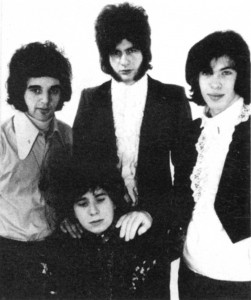
The Attack, 1968. L to R: John Cann (a.k.a. DuCann), Keith Hodge (seated), Roger Deane, Richard Shirman. (Photo courtsey Phil Smee)
UT: You did quite a lot of recording with that lineup, but none of it was released at the time—why was that?
RS: Quite a lot of it was after we didn’t even have a record contract any more. There’s the album called Final Daze [on Angel Air] with some of it on—I think John Cann put Final Daze out—but [for About Time] I picked only the songs from the third phase of the group that I thought were best, like “Freedom For You” and “Mr Pinnodmy’s Dilemma,” those sort of things. That was when it was just guitar, bass and drums, and that was a good group. I think John Cann paid for most of these recordings, as I recall.
UT: Were these the tracks that were originally going to have made up an album that was to have been called Roman God of War?
RS: Roman God of War, I remember Keith Hodge came up with the name, but it was a joke. It may just have been the fact that I was ‘out to lunch’ a bit at the time that I didn’t notice these things going on, but I wasn’t aware there was going to be any album at all.
UT: So it may have just been a sort of a fantasy album title? If we do an album this is what we should call it.
RS: Absolutely. You’ve hit the nail on the head.
UT: Any idea where the idea for that title came from?
RS: Well, Keith Hodge, the little fat Welshman—a great drummer, but a little fat Welshman nevertheless. It was at a time where the biggest club in London was the Middle Earth; there was a shop in Kings Road called Gandalf’s Garden—it was all that stuff. Fantasy was quite a thing, and so Roman God of War? Oh yes, fine. If we’d actually have released an album, I can tell you one thing for sure: it would have not have been called Roman God of War!
UT: Well, that’s a relief! (laughs)
RS: Isn’t it just!
UT: When the Attack split up you were originally in Andromeda with John, but that didn’t last long. What happened?
RS: The truth of the matter is the manager took me aside one day and said, “This isn’t working, is it?” I didn’t enjoy myself with them one little bit. There’s probably a couple of reasons, one I didn’t realize and one I did. The one I did realize was I wasn’t very impressed with the bass player, or/and the drummer, who was getting over a broken leg, so the bass drum wasn’t really all there is the polite way of putting it. The bass player was one of these guys—and don’t get me wrong, I still know him and have talked to him on the phone a time or two and we used to play in bands on the blues scene in South London quite a lot and bump into each other—but I just didn’t like his bass playing. He was bit what I describe as widdly-widdly (laughs) Just as I describe Alvin Lee’s guitar playing as widdly-widdly In fact, if you listen to any of the Attack stuff, none of the guitar solos are widdly-widdly. There’s no sort of foot on the monitor and all that bollocks! (laughs) So that was certainly one reason, and the other thing was, truthfully, I suppose because I didn’t like it that much I didn’t bother to learn lyrics. We’d go and play gigs and I used to bluff it like crazy! Don’t get me wrong, no one in the audience would’ve known I didn’t know the lyrics. I don’t think the band knew I didn’t know the lyrics. But I wasn’t enjoying myself and the manager said, “I think it’s time to go,” and I said “OK,” and in fact it wasn’t that long ago, maybe six months to a year ago, that I talked to John about it, and apparently the group didn’t even know the manager had told me to go, it was nothing to do with them!
UT: So they thought you just decided to leave?
RS: Well, that’s what John says, but whether or not it’s true I don’t know. But, there again, I don’t care! (laughs)
UT: What’s the story behind the unreleased acetate of “Sympathy for the Devil” and “Anything”?
RS: I was such an arrogant, stupid person. There was a guy I’d met who was actually the head of the record company for Andromeda, and he was [also] the head of Elektra in London, a guy called Clive Selwood, a very nice chap, and though I was no longer with Andromeda, obviously, he said, “Make a demo and who knows.” So I made a demo, which was “Sympathy For the Devil” and on the other side “Anything,” and Jac Holzman, the head of Elektra, came over as a result of that and said “Yeah! I really like this and want to record you.” So I had the opportunity, but of course not, because I knew better: “Oh yeah, but I want a big horn section!” So he said, “Hmmm… don’t know about that, but tell you what, you go in the studio with this horn section and if I like it, OK.” And I’d also asked for a ridiculous amount of money. So I made this thing and, to be honest, if one listened to it through rose-tinted earphones, one would describe it as total crap. So he said, “No. I’m still interested if you get something together like the first thing, but the thing with the horns, forget it!” So I said, like an arsehole, “It’s that or nothing!” History shows us that it was nothing! (laughs) Can you imagine? In those days all you had to be was on Elektra and you were guaranteed 100,000 albums sales straight away. And to be the first British act, I mean the amount of publicity that would have come with that—but, no, I said, “I want this and I want this and I want this…Take it or leave it,” and they smiled at me and left it. (laughs)
UT: So after that you pretty much dropped out of music for ten years or so, right?
RS: No. Don Arden had a mate in Birmingham and I went up and joined a group up there. It was quite good but I was only up there about six months. I didn’t like Birmingham at all—it was mostly bombsites and stuff, and I didn’t know anybody. Then I think I bowed to the well-known parental pressure and went and got a straight job or two, because I didn’t have any money, of course—the usual stuff.
Ten years later, in 1979, Shirman formed a new rock group called the Attack, which lasted a couple of years. He then put together a successful blues band, Hershey & the 12-Bars, complete with the horn section he’d always desired. In 1991 he was diagnosed with Multiple Sclerosis, but continued to perform with Hershey & the 12-Bars until 2004.
As for the original Attack: “Until about seven or eight years ago, I thought the Attack as a whole entity was dead and buried and way back in the past,” he says, “and so I didn’t give it any thought at all. It was only more recently, because apparently Mojo mentioned the Attack from time to time, and there was a pullout a few years ago with ‘The Greatest 100 Psychedelic Tracks of All Time’—50 American and 50 British—and, blow me, one of the songs was an Attack song.” [“Colours of My Mind” placed at #18 in Jon Savage’s chronological countdown of UK psychedelia, right between John’s Children’s “Midsummer Night’s Scene” and the Beatles’ “It’s All Too Much.”]
It was then that Richard began approaching various record companies about releasing a definitive Attack collection, which, after many years, resulted in About Time.
Originally there were plans for some Attack reunion gigs to coincide with the CD’s release, beginning with a launch party at the 100 Club. Sadly though, these plans had to scrapped due to Richard’s worsening health. “It was only about two to three years ago that I got into the state that I can no longer play,” he reveals. “I’m just not physically up to doing it and how much does that piss me off? Apparently I had what in medical terms can be described as a ‘massive heart attack’ last autumn, and I’ve only got half of my heart left, and what with the MS, and I’m gradually a bit weaker, there’s just no way I would be able to gig, which just really pissed me off. Still, there we go.”
Although disappointed that he won’t be able to take the Attack’s music to the stage again, Richard Shirman is resolutely upbeat and unfailingly proud of the musical past he’d left for dead and buried—and rightfully so: The Attack are right up there with the best. •
(Originally published in Ugly Things #25, Summer 2007)

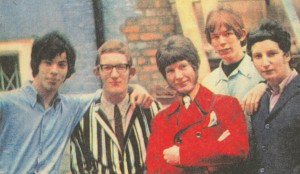
certainly like your web site but you have to check the spelling on several of your posts. Several of them are rife with spelling problems and I find it very bothersome to tell the truth nevertheless I’ll surely come back again.